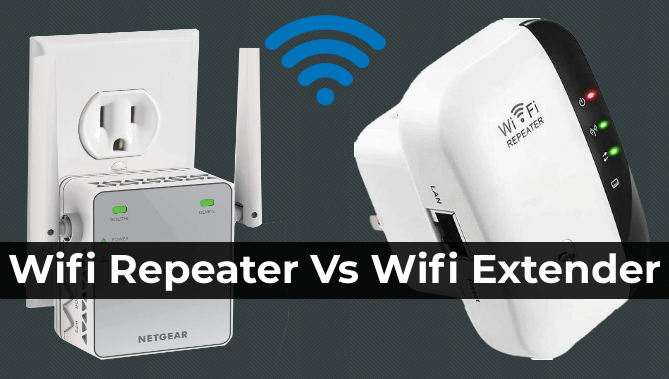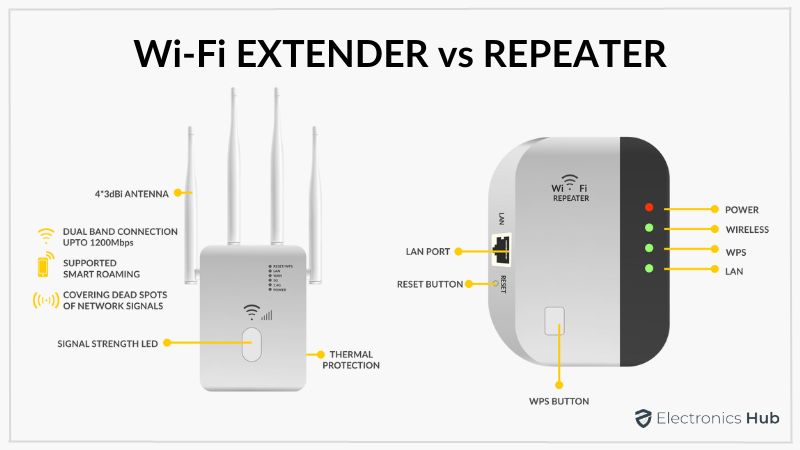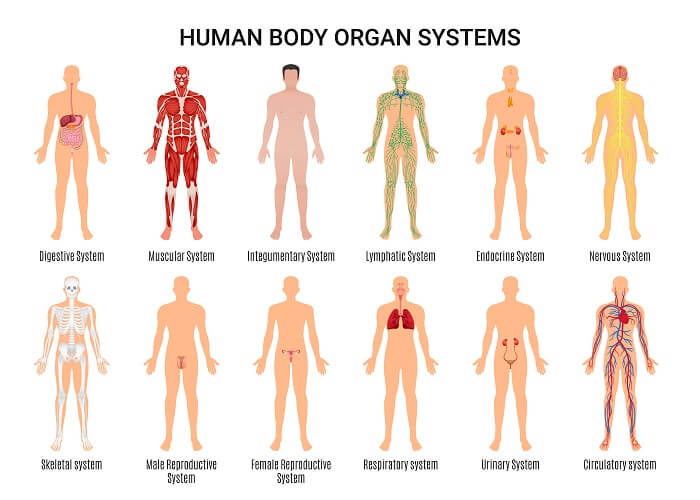Which Is Better Wi-Fi Repeater Or Extender?
A Wi-Fi repeater and extender are both devices that extend the range of your router’s wireless signal. They do this by amplifying and rebroadcasting the signal from your router, allowing you to access the internet in areas of your home or office that were previously out of range. But, which one is better for your particular situation? That depends on several factors, such as the type of router you have, the size of your home, and your budget. Here, we’ll explain the differences between Wi-Fi repeaters and extenders, and provide some tips to help you decide which one is best for you.
Overview of Wi-Fi Repeaters and Extenders
Wi-Fi repeaters and extenders are two of the most popular options when it comes to improving wireless network coverage. Both devices help boost the reach of a wireless network, but what exactly are the differences between them?
A Wi-Fi repeater is a device that broadcasts a wireless signal, extending the range of an existing network. The repeater captures the signal from the router, amplifies it, and sends it out again. However, the signal is only amplified, not extended, and as such, may not reach as far as an extender.
On the other hand, a Wi-Fi extender is a device that connects to a router and creates a new access point, extending the range of the existing network. It works by receiving the wireless signal from the router and rebroadcasting it, creating a new connection point. Unlike a repeater, an extender creates an entirely new access point, allowing users to connect to the network at a greater distance.
When deciding between a Wi-Fi repeater or an extender, it’s important to consider your needs and the layout of your home. A repeater is an ideal choice if you only need to extend the signal a short distance, while an extender is better for large distances or homes with multiple floors. Ultimately, the best device for you depends on your specific needs and budget.
Advantages of Wi-Fi Repeaters
and Extenders
When it comes to boosting the range and signal power of your Wi-Fi network, it can be hard to decide between a Wi-Fi repeater and extender. Each has its own advantages, so it’s important to understand the differences between the two. Wi-Fi repeaters and extenders are both designed to increase the area of coverage for a wireless network, but in different ways. A Wi-Fi repeater is a device that captures a signal from a router or access point and rebroadcasts it to create a second network with the same name and a similar password protection. This allows users to extend the range of their wireless network without having to set up a completely new network. On the other hand, a Wi-Fi extender is a device that connects to an existing network and receives the signal from the router, then amplifies the signal and broadcasts it to areas where the signal is weak or nonexistent. This helps to fill in the ‘dead spots’ in the network’s coverage area.
When deciding which type of device is better for your needs, it’s important to take into consideration the size of your space, the number of users, and the types of devices being used. Wi-Fi repeaters are great for extending the range of a network in a small area, while Wi-Fi extenders provide more robust coverage in larger spaces. Both can be used to ensure that you get the strongest signal possible in all areas of your home or office.
Disadvantages of Wi-Fi Repeaters
and Extenders
Wi-Fi repeaters and extenders are both popular solutions for boosting a wireless network’s range and coverage. Despite their advantages, these devices also come with some drawbacks. Before making a decision about which is best for your needs, it’s important to understand the disadvantages of using a Wi-Fi repeater or extender.
One major disadvantage of using a Wi-Fi repeater or extender is the potential for signal degradation. The signal is repeated or extended from its original source, which means that the further it is from the original router, the weaker the signal will be. This can result in slower speeds, latency issues, and dead spots in the coverage area.
Another potential disadvantage of using a Wi-Fi repeater or extender is the complexity of the setup. Depending on the device and the environment, users may need to configure the device’s settings and connect it to the router in order to get the best performance. This can be a difficult process for those without technical knowledge.
Thirdly, Wi-Fi repeaters and extenders can be expensive. While they may be cost-effective in the long run, the initial cost can be quite high. This means that it may not be a viable option for those on a budget.
Finally, Wi-Fi repeaters and extenders can be disruptive to other wireless devices. If multiple devices are attempting to connect to the same repeater or extender, they can interfere with each other’s signals, resulting in connection issues.
Ultimately, the choice between a Wi-Fi repeater or extender comes down to the user’s needs and budget. It’s important to weigh the advantages and disadvantages of each device before making a decision.

Advantages of Wi-Fi Extenders
Wi-Fi extenders are becoming increasingly popular among home and office users looking to expand the coverage of their wireless networks. Wi-Fi extenders offer several advantages over traditional Wi-Fi repeaters. The most prominent advantage of Wi-Fi extenders is that they are easy to set up and can be installed anywhere, without the need for additional wiring. With their compact size, they can often be positioned in places where other solutions are not possible, such as the middle of a large house. Wi-Fi extenders also provide a more reliable connection than Wi-Fi repeaters, as they use two separate antennas to receive and transmit signals, which prevents signal loss. Additionally, they can be connected to multiple devices, allowing for better coverage without the need to add more repeaters. Furthermore, Wi-Fi extenders are more energy efficient than Wi-Fi repeaters, which can help reduce electricity bills. Finally, Wi-Fi extenders are often cheaper than Wi-Fi repeaters, making them an economical option for those looking to expand their wireless networks.
Disadvantages of Wi-Fi Extenders
The common drawbacks of Wi-Fi extenders are that they are usually more expensive than Wi-Fi repeaters and can be difficult to install. Additionally, using an extender may result in signal degradation and slower speeds due to the need to route the signal to the extender, and then back to the router. Furthermore, extenders may not be able to reach certain areas in the home, which results in spotty coverage. Finally, extenders often require the user to manually switch between networks in order to access optimal coverage. All of these factors can lead to frustration and poor performance, making a Wi-Fi repeater a more attractive option.
Final Considerations for Choosing a Wi-Fi Repeater or Extender
When it comes to choosing a Wi-Fi repeater or extender, there are a few factors to consider. Range is a major factor, as repeaters can be used to extend the signal of a wireless router up to double the original distance. It should also be noted that repeaters will reduce the speed of the signal, so if speed is a priority, an extender may be the better choice. Extenders also have the advantage of being able to access the original router’s connection, whereas repeaters only extend the existing signal. Finally, the cost should be taken into account, as extenders are typically more expensive than repeaters.
Overall, the decision between a Wi-Fi repeater or extender will depend on the individual user’s needs. While repeaters are ideal for a simple solution to extending the range of a wireless router, extenders offer a more reliable connection and faster speeds. Additionally, the cost of an extender may be a deciding factor for some users. By considering all of these factors, users can make an informed decision that will best suit their needs.
FAQs About the Which Is Better Wi-Fi Repeater Or Extender?
1. What is the difference between a Wi-Fi repeater and an extender?
A Wi-Fi repeater is a device that takes the signal from an existing wireless router or access point and amplifies it to extend the range of the wireless network. A Wi-Fi extender, on the other hand, is a device that bridges two networks together, allowing for a stronger signal and a greater range of coverage.
2. What are the advantages of using a Wi-Fi repeater or extender?
Using a Wi-Fi repeater or extender can help extend the range of your wireless network, which will enable you to access the Internet in areas of your home or office that may have been previously out of range. Additionally, it can help reduce dead spots and interference, allowing for a more consistent wireless signal throughout your home or office.
3. How do I choose the best Wi-Fi repeater or extender for my needs?
When choosing a Wi-Fi repeater or extender, it is important to consider the range and coverage needed for your space, as well as the type of devices that will be accessing the network. Additionally, you should consider the speed of the repeater or extender and the type of encryption used. Finally, consider the cost and compatibility with your existing router or access point.
Conclusion
In conclusion, the choice between a Wi-Fi repeater or extender comes down to personal preference and use case. Each has its own advantages and disadvantages, and it is up to the user to decide which option works best for their needs. Ultimately, both solutions can help extend the reach of your existing Wi-Fi network, and both can provide great performance.




